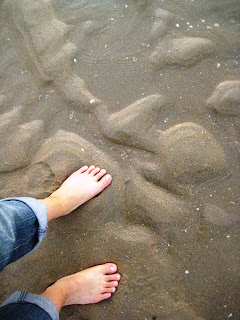The Arts Committee organised a Creative Food Arts event (directed and hosted by my own roommate, Febri!) last night, to take the strain off some of our brains from essays, I presume.
The theme was 'Flora and Fauna', and the aim was to design edible food according to this theme. I worked with a group that was just brought together by fate, but we worked well together. So we thought hard of various ingredients to make the different elements needed for an aquarium.
Here you can see that the 'sand' is fried rice, the rest of the 'water' is plain rice, the 'fishes' are carrots, fried potatoes, and cucumber; the 'rocks' being cauliflower, and long beans and rocket leaves for 'seaweed'. The 'cat' is made out of pineapple, banana, strawberry and licorice. And of course, he gets a bowl of yoghurt 'cream', but he's still looking for fish to catch.
H gave a great political commentary on our piece - that the cat is actually the World Bank, that already has plenty of cream funds, but is still looking to prey upon the small and defenseless fish countries of the developing world, haha!
Another group made a sushi snake! Slithering among broccoli and cucumber plants and carrot flowers. Luckily it ignores the yummy fried bakwan 'rocks', so we can eat them.

Another group made kebab 'caterpillars', with sausage, bell peppers, leeks and onions, and peppercorns for eyes, resting calmly on a bed of rice and radish and tomato flowers. Adorable!
This was the most elaborate creation of the night. A nasi tumpeng 'volcano' with sambal 'lava', surrounded by a 'toxic lake' of garlic, yoghurt and paprika sauce; broccoli 'forest', and fried tempe 'rocks'. For the fauna, mutated 'hummingbirds' of mushroom and chilli padi fly around, while a mushroom 'bear' with ikan bilis in his mouth hides in the broccoli.

















































